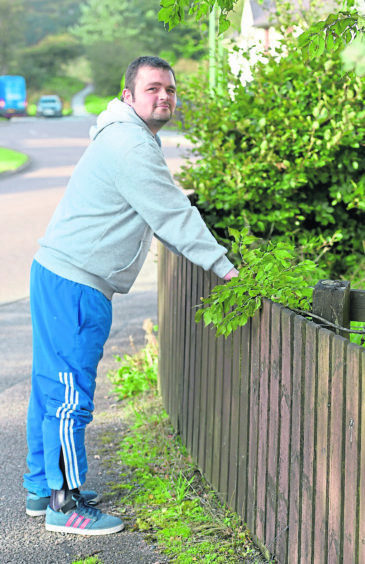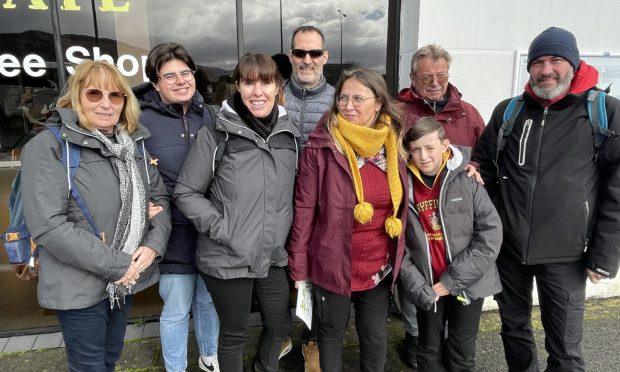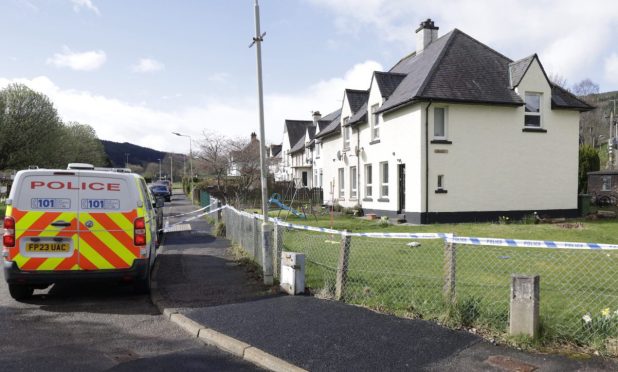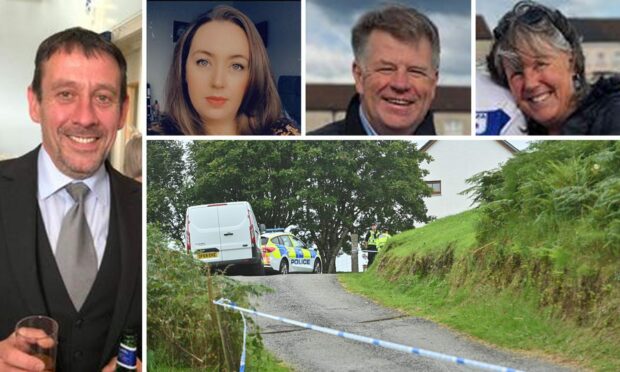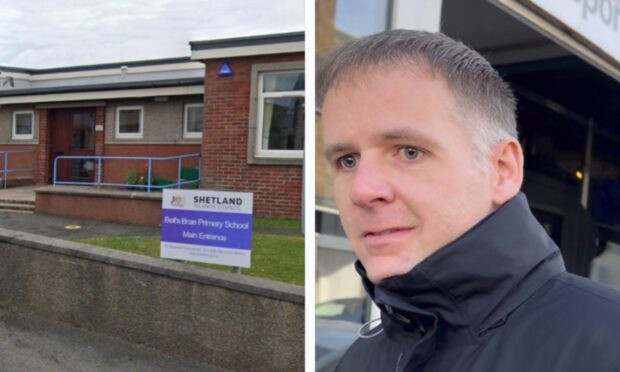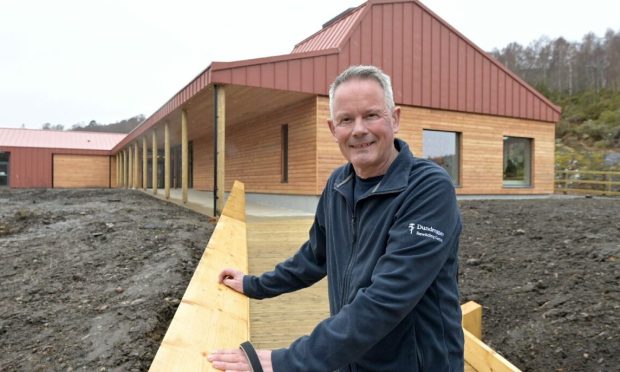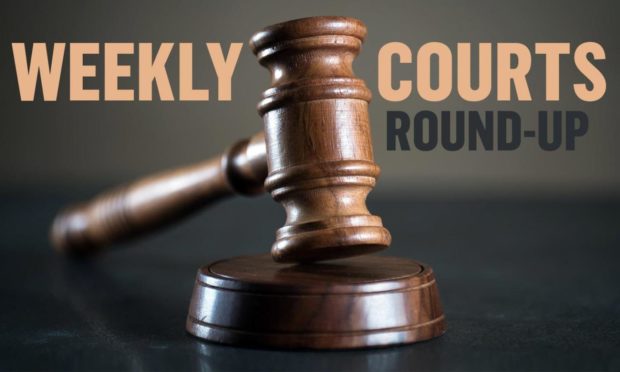At age 30, Gary Campbell’s body was failing him as the most brutal form of Multiple Sclerosis ravaged his system.
Bedridden and in constant pain, he was forced to give up his job and cease playing with step-son Kye, as the illness left him repeatedly hospitalised.
Little more than a year later, he has gone two months without a hospital visit and is walking again thanks to the “life-changing effects” of a potentially ground-breaking medication.
>> Keep up to date with the latest news with The P&J newsletter
Mr Campbell, from Caol, Fort William, is understood to be the only UK patient trialling, Ocrelizumab, a new medication for primary progressive Multiple Sclerosis.
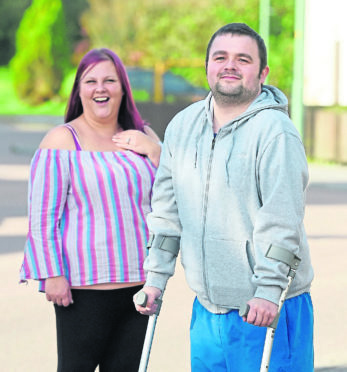 He is loath to dub it a “miracle drug” but his progress has been such that he is desperate to see it made more widely available in Scotland and elsewhere in the UK.
He is loath to dub it a “miracle drug” but his progress has been such that he is desperate to see it made more widely available in Scotland and elsewhere in the UK.
At present, however, he fears other MS sufferers may be deprived of its benefits after it emerged England and Scotland have pulled out of funding the drug.
It’s future now lies with the Scottish Medical Consortium, the authority who advise the NHS on what medicines are cost effective.
There are three types of MS, each with a different set of treatments and Mr Campbell has what is commonly known as “the worst one” primary progressive – the others are relapsing remitting and secondary progressive – which is an unrelenting condition that attacks the nerves in the brain and spinal cord.
At present there is only one licensed treatment for people with primary progressive MS and it is not currently available on the NHS in Scotland.
Mr Campbell had his first round of treatment of Ocrelizumab in July and since then has seen his health and wellbeing steadily improve.
He is slowly regaining his ability to move his legs and is walking with sticks, while there is less pain and two months free of hospital stays,
Mr Campbell said learning he had the condition changed his life “overnight”.
“I was a bricklayer, working up to 48 hours a week, and I tried to ignore the symptoms for a long time,” he said.
“My leg wouldn’t stop shaking though, so eventually I went to the doctor and was sent for tests.
“When I still hadn’t heard weeks later, I convinced myself it was good news, and then I was told I had primary progressive MS, for me the worst kind.
“I deteriorated very quickly but received incredible support from everyone. My partner has been the best support anyone could have asked for and my MS nurse in Inverness, Lyndsay Parks, and my neurologist, Dr Artal, have helped me so much.”
The family began to look at ways to combat the illness, joining an online group and researching experimental stem cell treatment, which led them to consider expensive treatment in Mexico or Russia as Mr Campbell’s condition worsened.
The couple, along with Mr Campbell’s stepson Kye, 13, were “totally blessed” when fundraisers raised £35,000 in less than a year to help Gary get his treatment.
Then his neurologist came up with another option.
“I knew immediately I wanted to be on the trial,” he said.
“I had an anxious few weeks waiting to find out if it would be a suitable candidate. When I got the news I was going onto the trial I was delighted – though I heard soon after that England and Scotland had pulled out of funding the drug for primary progressive patients.”
The drug is having a fundamental effect on his life and while he is cautious not to make miracle claims about its nature, he says “We have slowed right down on our fundraising for the stem cell treatment.
“Obviously we hope the money might not be necessary, because this drug might be the answer we are looking for.”
A spokesman for NHS Highland said: “Ocrelizumab is currently being appraised by NICE (National Institute for Health and Care Excellence) and SMC (Scottish Medicines Consortium) to determine NHS availability in the UK for both RRMS and PPMS.
“As this appraisal process has yet to be completed, Dr Artal says it could be some considerable time until Ocrelizumab is approved for both RRMS and PPMS and becomes available in Scotland.”
Morna Simpkins, Scotland Director for the MS Society, added: “At present there is only one licenced treatment for people with Primary Progressive MS and it’s not currently available on the NHS in Scotland.
“In Mr Campbell’s case we can clearly see the impact that access to treatments can have – not only in managing his MS but in improving his overall quality of life.
“Earlier this year the pharmaceutical company withdrew their submission to get Ocrelizumab available on the NHS in Scotland for primary progressive MS.
“We want all parties to come back to the table and work out how we can get this treatment available for those that could benefit.”
Ocrelizumab: The background
Ocrelizumab is being developed as a treatment for relapsing remitting (RRMS) and primary progressive Multiple Sclerosis (PPMS).
The drug is an anti-body acting against CD20+ B cells, a type of white blood cell thought to be involved in the abnormal immune response that attacks the myelin coating of nerve cells.
A relatively new treatment, it was introduced in Canada and the United States to treat RRMS just over a year ago.
In NHS Highland, consultant neurologist Dr Francisco Javier Carod Artal is the principal investigator in a clinical study for the use of Ocrelizumab in treating RRMS.
Trials being carried out as part of the study began a year ago, and involve patients receiving intravenous infusions every six months to try to prevent relapses.
Dr Artal said: “It is important to note that this therapy would be more appropriate in the early stages of PPMS when a significant inflammatory component is seen, and not in the later advanced stages of PPMS where we see neuro-degeneration.
“In the early stages of active PPMS active plaques with enhancement with Gadolinium contrast are usually detected. However, in advanced stages of PPMS axonal degeneration and absence of active plaques is usually seen.
“Therefore, MRI scans of brain and spine are required in the diagnosis of PPMS and to establish the level of activity of the disease.
“Patients with PPMS clinically present with a steady decline in function from the beginning, absence of relapses and disability progression.”
Why is MS so prevalent in the north of Scotland?
In the UK, around 100 people every week are diagnosed with Multiple Sclerosis, a debilitating disease affecting the brain, spinal cord, and the optic nerves in the eyes.
MS is the most common disabling neurological disease among young adults. It is most often diagnosed in people between the ages of 20 and 40, and women are almost twice as likely to develop it as men.
It is internationally recognised that the prevalence in the north of Scotland is particularly high.
The last study carried out in the north-east, in 2009, found the level per 100,000 people to be 229 in Aberdeen, 295 in Shetland and 402 in Orkney.
While there is no current or accurate data on the exact number of people living with MS, the rule of thumb used by the Multiple Sclerosis (MS) Society Scotland is “the further north you go, the higher the prevalence”.
A report published in 2018 by the Multiple Sclerosis Register, said: “Nationally across Scotland we have observed an average annual incidence rate of 8.64 cases per 100,000 people.
“Across Scotland, incidence rates vary considerably, ranging from 6.24 cases per 100,000 people in NHS Borders to 17.36 cases per 100.000 people in NHS Orkney, in line with the well recognised relationship between latitude and incidence rate.”
In Shetland the MS incidence is 10.79 per 100,000 people, in Highland it is 11.61, Tayside it is 12.24, in Grampian it is 9.93 people who have been diagnosed with MS.
